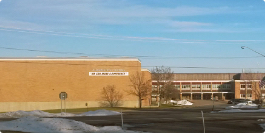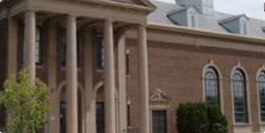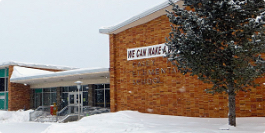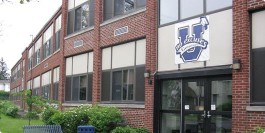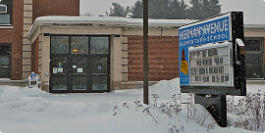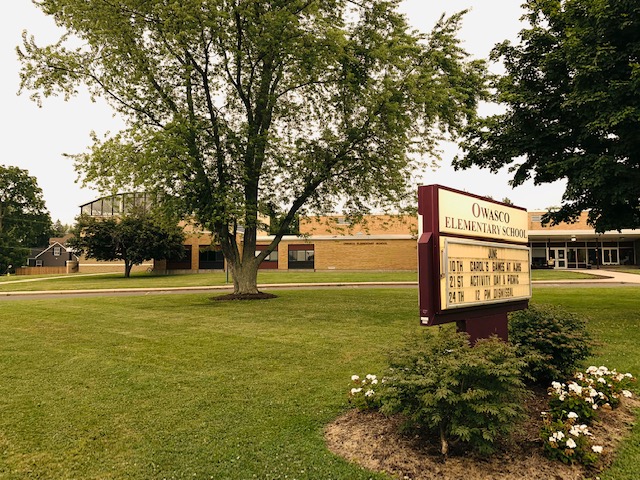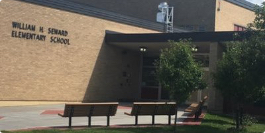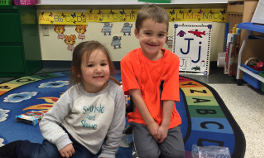Eclipse is an unique learning opportunity for Auburn students
Christopher Sciria
AECSD Public Information Specialist
The total solar eclipse on April 8 is being called a once in a lifetime event, but it’s also a once in a lifetime learning experience for Auburn Enlarged City School District students.
NASA and Art Technically, a nonprofit that promotes and provides STEM, STEAM, and Arts education to K-12 students, provided a program and ISO certified glasses specifically for our students in grades 5-8 where Lily K. Donaldson came and presented on the science behind a solar eclipse and guidelines for viewing the eclipse safely.

In addition, the district’s teachers have been educating students about the eclipse, including science lessons at Auburn High School and Auburn Junior High School and in the elementary STEM classes; and students in grades kindergarten through fourth grade were also provided with ISO certified child-sized glasses, along with guidance in how to use them safely.
At Auburn High School, science teacher, Brian Bealer said, “I'm doing my best to make sure they know and they're ready for it.” “It's a great opportunity to take what you're doing in the classroom and bring it into the real world and not just describe something that they can't see. It's very rare to have something like this happen, especially during the school year.”
Bealer told his students to be prepared that it could be difficult getting around.
“I mentioned the event that the district is having over at Holland Stadium,” he said, “if they wanted to go there, they should get there a couple hours early just because of the traffic. It's best to just get where you need to be and wait for the eclipse.”
For Auburn High School astronomy and science teacher Carl Gutelius it’s an opportunity to also focus on what’s happening here on Earth.
“We always talk about eclipses, how they function, but we're focusing more on the on-Earth effects of it,” he said. “What are we going to experience, not so much why it's happening. Being in the total eclipse path is going to be a brand new thing. So what's animal behavior going to be like, what are people's behavior going to be like? We actually delved into the real world aspects of how it's going to affect the kids and what they're going to see in the businesses in the area, in addition to what's actually happening, because that's fascinating.”
Bealer and Gutelius said their students have asked questions about what happens if it's cloudy.
“It's (totality) going to be under two minutes and this area might be cloudy,” Gutelius said. “We’re prepping the kids for that. What can they still experience? Making sure that they understand even if it's cloudy, it's still going to be different. It's not going to be just a cloudy day. It's going to get pitch black out. The cloudier it is, the darker it could get. If we have a beautiful sunny day and there's an eclipse, it would be almost like night time, but if we have clouds, it's going to be pitch black out. That might be a unique experience.”
Students have also asked how to watch the eclipse safely and what exactly happens during totality.
“I think any education we do about it has to focus on safety first,” Gutelius said. “If the kids understand the safety of it, feel comfortable with it, then I think they'll be more comfortable going out and experiencing it. We don't want kids to be scared of it, right?”
Donaldson, of Art Technically, also spoke to the younger students about the importance of being safe.
“Because we are going to be in the path of totality here in Auburn,” she said, “it's very important that kids have an understanding of how to safely view the eclipse because it can be very, very dangerous to look at the sun without your safety glasses on. Understand when it's OK to look and when it's not OK, when you need the glasses on. NASA's very interested in promoting that idea of safety.”
For Donaldson, who has worked as a research assistant for NASA and is a PhD candidate at the Rensselaer Polytechnic Institute, the eclipse is a way to get youngsters interested in science.
“One of my favorite parts of my job is getting to talk to students about science,” she said. “It's really awesome that I get to do science myself but encouraging younger people to get involved with it and maybe think about pursuing careers in science, it's really important to me.”
Donaldson and Gutelius agree the eclipse is an important lesson to show students they’re part of a larger universe.
“I hope that they just get a viewpoint that the universe is gigantic and we're just this little planet, floating around in it and all these other planetary bodies are going around us and we're going around others,” Donaldson said. “I hope they're inspired, everything affects one another and this moon that we see in the sky every day, has this really awesome effect that we're going to observe on Monday.”
“It’s hard to impress a teenager and you really have to impress that this is not going to be like anything you've ever seen before,” Gutelius said. “Birds are going to stop chirping, the temperatures are going to drop. You can see the shadow coming at you. All these kinds of cool things that you'll never get a chance to experience again. So just really impressing upon them that this isn’t an everyday thing, it’s once in a lifetime. You're going to be disappointed that you missed out.”
The partial eclipse starts at 2:08 p.m., will be in totality from 3:22 to 3:24 p.m. and end at 4:35 p.m. Students and the community are invited to view the eclipse at the district’s event at Holland Stadium that starts at 2:15 p.m.

